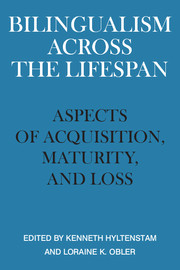Book contents
- Frontmatter
- Contents
- List of contributors
- Preface
- 1 Bilingualism across the lifespan: an introduction
- 2 Early differentiation of languages in bilingual children
- 3 Variation in children's ability to learn second languages
- 4 Idiomaticity as an indicator of second language proficiency
- 5 Prefabs, patterns and rules in interaction? Formulaic speech in adult learners' L2 Swedish
- 6 The imperfect conditional
- 7 Spanish, Japanese and Chinese speakers' acquisition of English relative clauses: new evidence for the headdirection parameter
- 8 Distinguishing language contact phenomena: evidence from Finnish–English bilingualism
- 9 The boustrophedal brain: laterality and dyslexia in bi-directional readers
- 10 Deterioration and creativity in childhood bilingualism
- 11 Crosslinguistic influence in language loss
- 12 Bilingualism in Alzheimer's dementia: two case studies
- 13 Language processing in the bilingual: evidence from language mixing
- Index
3 - Variation in children's ability to learn second languages
Published online by Cambridge University Press: 05 June 2012
- Frontmatter
- Contents
- List of contributors
- Preface
- 1 Bilingualism across the lifespan: an introduction
- 2 Early differentiation of languages in bilingual children
- 3 Variation in children's ability to learn second languages
- 4 Idiomaticity as an indicator of second language proficiency
- 5 Prefabs, patterns and rules in interaction? Formulaic speech in adult learners' L2 Swedish
- 6 The imperfect conditional
- 7 Spanish, Japanese and Chinese speakers' acquisition of English relative clauses: new evidence for the headdirection parameter
- 8 Distinguishing language contact phenomena: evidence from Finnish–English bilingualism
- 9 The boustrophedal brain: laterality and dyslexia in bi-directional readers
- 10 Deterioration and creativity in childhood bilingualism
- 11 Crosslinguistic influence in language loss
- 12 Bilingualism in Alzheimer's dementia: two case studies
- 13 Language processing in the bilingual: evidence from language mixing
- Index
Summary
Introduction
The question of individual differences in cognition is one which draws the interest of many disciplines. What causes the vast variation in individual skills and aptitudes? The most obvious response is that a combination of genetic and environmental factors shape our cognitive personalities much as they shape our emotional personalities. As a neuropsychologist, my focus is on the different areas of the brain in which linguistic and other cognitive functions are processed.
Neuropsychology, a comparatively young science, has over the last century identified the areas of the brain which are responsible for the processing of specific cognitive skills such as language, visuo-spatial abilities, and reading. In order to identify and associate brain areas and cognitive skills, neuropsychological research has traditionally focused upon the similarities between the abilities of human subjects. A large amount of information on brain function was gathered from stroke and head trauma victims in whom disabilities caused by damage to certain areas were studied. Currently, interest in research is being directed toward individual differences, within the structure of species similarity. For instance, interest in the brain organization of left handers and women has been increasing. Evidence is mounting that individual differences in brain organization are important. Given the infinite permutations of human genetic, hormonal, prenatal and postnatal environments, I find it easy to agree with Gray (1948) that each person's “brain is as individual to its possessor as his face.”
- Type
- Chapter
- Information
- Bilingualism across the LifespanAspects of Acquisition, Maturity and Loss, pp. 41 - 54Publisher: Cambridge University PressPrint publication year: 1989
- 18
- Cited by



